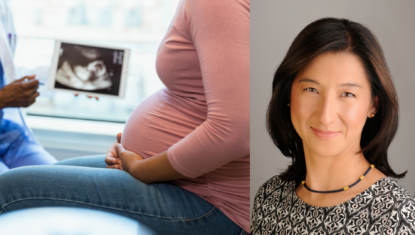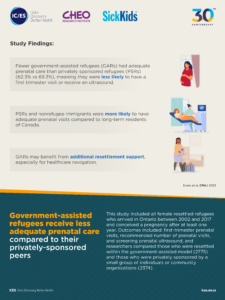03/04/2023
Ottawa, Ontario — Monday April 3, 2023

Government-assisted refugees were less likely to receive adequate prenatal care than privately sponsored refugees, found a new study published April 3, 2023, in CMAJ (Canadian Medical Association Journal).
Canada has two main pathways to resettle refugees: government assistance and private sponsorship by family members or non-family volunteers.
To determine whether refugees receive adequate prenatal care (defined as initiation of prenatal care by 13 weeks’ gestation; receipt of a minimum number of prenatal care visits, as recommended by the Society of Obstetricians and Gynaecologists of Canada; and receipt of a prenatal fetal anatomy ultrasound between 16 and 21 weeks’ gestation), researchers looked at data from ICES on 2,775 pregnant government-assisted and 2,374 privately sponsored refugees in Ontario, the province that receives almost half of the country’s refugees.
Researchers found that over the study period (2002–2020), government-assisted refugees were less likely to receive adequate prenatal care services than privately sponsored refugees (62.3% vs. 69.3%), a difference that remained significant after adjusting for potential confounders.
“Our findings suggest that private sponsorship plays a role in facilitating prenatal care use, and that government-assisted refugees may benefit from additional resettlement support related to health care navigation,” said Dr. Astrid Guttmann, senior scientist, ICES, and a pediatrician and senior scientist at The Hospital for Sick Children (SickKids), Toronto, Ontario.
Interestingly, the researchers also found that privately sponsored refugees and non-refugee immigrants were more likely to have adequate prenatal visits than long-term residents of Canada.
“Increased visits related to perceived or higher medical need or need for counselling may be reasons for more visits in the privately sponsored refugees and nonrefugee immigrant populations,” said Dr. Andrea Evans, ICES Fellow, Investigator at the CHEO Research Institute, and pediatrician at CHEO, Ottawa, Ontario.
The authors suggest that education and language may be barriers limiting access to prenatal care for government-assisted refugees, and this finding could be useful for increasing access to health care.
Reference: Andrea Evans MDCM, Joel G. Ray MD, Peter C. Austin PhD, Hong Lu PhD, Sima Gandhi MSc, Astrid Guttmann MDCM. Receipt of adequate prenatal care for privately sponsored versus government-assisted refugees in Ontario, Canada: a population-based cohort study. CMAJ. 2023 April 3;195:E469-78. doi: 10.1503/cmaj.221207

Text version of infographic content
-30-
Please credit CMAJ, not the Canadian Medical Association (CMA). CMAJ is an independent medical journal; views expressed do not necessarily reflect those of its owner, CMA Impact Inc., a CMA company, or CMA.
MEDIA NOTE: Please use the following public link after the embargo lift: https://www.cmaj.ca/lookup/doi/10.1503/cmaj.221207
Media contacts:
Jennifer Ruff
Director of Communications
CHEO Research Institute
(613) 261-3979
[email protected]
Misty Pratt
ICES
[email protected]
Kim Barnhardt
CMAJ
[email protected]
About the CHEO Research Institute
The CHEO Research Institute coordinates the research activities of CHEO and is affiliated with the University of Ottawa. The seven programs of research at CHEO RI focus on a full spectrum of pediatric topics. Key themes include cancer, diabetes, obesity, mental health, emergency medicine, musculoskeletal health, electronic health information and privacy, and genetics of rare disease. At the CHEO Research Institute, discoveries inspire the best life for every child and youth. For more information, visit cheoresearch.ca.
